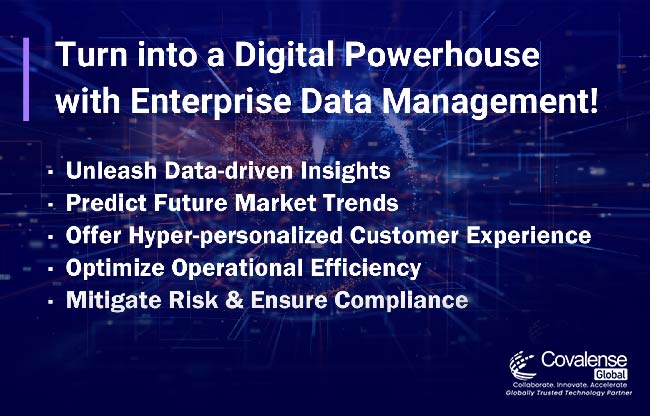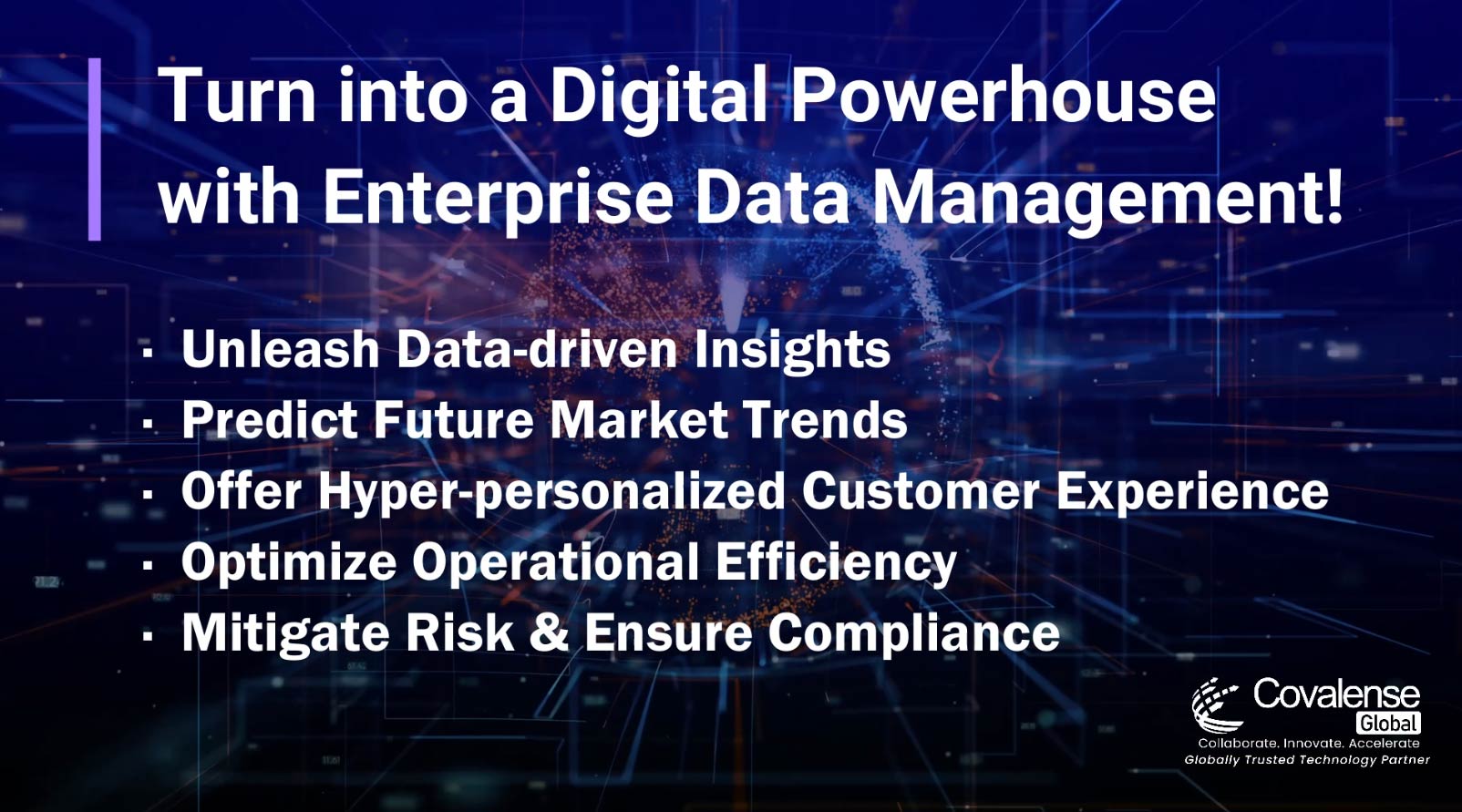
Embrace the Future, Today with Enterprise Data Management!

In the digital age, data has emerged as the lifeblood of enterprises, fueling decision-making processes, driving innovation, and enabling organizations to stay competitive in an ever-evolving business landscape. With the exponential growth of data volumes, the need for effective enterprise data management (EDM) has become more critical than ever. This article delves into the intricacies of EDM, exploring its key components, benefits, and best practices.
Enterprise data management encompasses the processes, policies, architecture, and tools used by organizations to strategically manage, protect, and leverage their data assets throughout their lifecycle. It goes beyond mere data storage, involving the integration of data from diverse sources, ensuring data quality, and providing a framework for data governance.
Key Components of Enterprise Data Management:
- Data Governance: At the heart of EDM is data governance, which defines the policies, roles, responsibilities, and processes that guide the overall management of an organization’s data. It ensures data accuracy, integrity, and security, establishing a framework for decision-making and compliance.
- Data Integration: Data integration involves combining data from various sources, formats, and platforms to provide a unified view. This process enables organizations to break down data silos, fostering collaboration and improving the accuracy of analyses.
- Data Quality Management: Maintaining high-quality data is imperative for effective decision-making. Data quality management involves processes to identify, correct, and prevent errors in data, ensuring that the information used for analysis and decision-making is accurate and reliable.
- Master Data Management (MDM): MDM focuses on creating and managing a single, consistent, and accurate version of master data, such as customer or product information, across an organization. This ensures that different departments use a common understanding of critical data elements.
- Data Security and Privacy: Protecting sensitive data is a top priority in EDM. Robust security measures and compliance with privacy regulations are essential to safeguarding data from unauthorized access, breaches, and ensuring the trust of customers and stakeholders.
- Metadata Management: Metadata, or data about data, plays a crucial role in EDM. Managing metadata involves capturing and maintaining information about data attributes, relationships, and usage, providing context and aiding in data discovery and understanding.
The Benefits of Effective Enterprise Data Management:
- Informed Decision-Making: EDM provides organizations with a solid foundation for data-driven decision-making. Accurate, timely, and integrated data ensures that executives have the information they need to make informed choices that drive business success.
- Operational Efficiency: By breaking down data silos and streamlining data processes, EDM enhances operational efficiency. Employees can access the right information when needed, reducing manual efforts and minimizing errors.
- Regulatory Compliance: In an era of increasing data regulations, EDM helps organizations stay compliant with data protection and privacy laws. This not only avoids legal consequences but also builds trust with customers who are increasingly concerned about how their data is handled.
- Improved Customer Experience: Understanding and managing customer data effectively contribute to delivering a personalized and seamless customer experience. With a 360-degree view of customer information, organizations can tailor their products and services to meet customer expectations.
- Innovation and Agility: EDM provides a solid foundation for innovation by enabling organizations to experiment with new ideas and technologies. Access to accurate and relevant data fosters agility, allowing businesses to adapt quickly to changing market conditions.
Best Practices for Successful Enterprise Data Management:
- Establish a Data Governance Framework: Define clear policies, roles, and responsibilities to ensure effective data governance. This framework should encompass data quality standards, security protocols, and compliance measures.
- Implement Robust Data Integration Strategies: Develop comprehensive data integration strategies to break down silos and ensure a unified view of data across the organization. This involves selecting the right integration tools and platforms that align with business objectives.
- Prioritize Data Quality: Institute proactive data quality management processes to identify and rectify data errors. Regular data quality assessments and monitoring mechanisms should be in place to maintain high standards.
- Invest in Master Data Management: Implement MDM solutions to create a single source of truth for critical data elements. This ensures consistency across the organization and facilitates accurate reporting and analytics.
- Adopt Advanced Analytics and Machine Learning: Leverage advanced analytics and machine learning tools to derive meaningful insights from data. These technologies can help automate data analysis, uncover patterns, and predict future trends.
- Stay Compliant with Data Regulations: Regularly update data protection and privacy policies to stay in compliance with evolving regulations. Ensure that employees are well-informed about data handling practices and the importance of data security.
- Educate and Empower Employees: Foster a data-driven culture by providing training and education on data management practices. Empower employees to understand the value of data and their role in maintaining its quality and security.
In an era where data is the currency of business success, effective enterprise data management is no longer optional—it’s a strategic imperative. By embracing comprehensive data governance, integration, quality management, and security measures, organizations can unlock the full potential of their data assets. While challenges persist, the benefits of successful EDM—including informed decision-making, operational efficiency, and innovation—far outweigh the complexities. As businesses navigate the seas of digital transformation, a robust enterprise data management strategy becomes the compass guiding them towards success in the data-driven future.
Author: Sales team
Date: 18 January 2023
